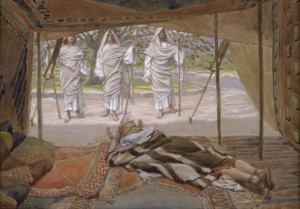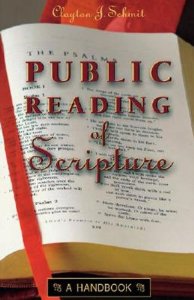Several of us committed to read the Bible all the way through in 2015. If you are in that group, did you make it? If you are not in that group, is there someone you know who participated? We used the “Chronological Bible,” a reorganization of every verse of scripture according to the order of biblical events. It has been a fascinating journey through scripture, and now that it’s complete, I’d like to offer a couple of reflections on the process. Continue reading
Letting Scripture Breathe
What are you reading in the Bible these days? What is your routine? Do you read a lot, or a little? We can get tied up in a lot of questions like these when we think about our spiritual lives.
Here’s a different sort of question to ask yourself: Where does scripture breathe into your life? Continue reading
It Matters How You Read the Bible
A couple of Sundays ago, we watched the movie “Left Behind” (starring Kirk Cameron, from 2000) as part of our “Faith and Film” series. Our lively and interesting discussion after the film left me thinking about an important issue:
How do you go about reading the Bible? That is, what do you expect to find when you open the Bible’s pages?
Our expectations of scripture have a tremendous influence on our discoveries in it. Continue reading
How to Read Scripture
Many of us at Mt. Haley are about to embark on a year-long journey through God’s Word. We will be reading through the “Chronological Bible” – every verse of scripture arranged, to the best of our understanding, in the order in which biblical events occurred. Whether or not you have read through the Bible before, this will surely be a fascinating experience!
Reading the Bible regularly is an important part of the life of a disciple of Jesus. But if you are like me, sometimes reading the Bible becomes mundane, repetitive, and – dare I say it? – boring. Sometimes I find myself scanning over words on the page and not allowing them to sink into my soul, to shape how I think, to speak new truths to me. I believe this is a pretty common challenge for anyone who does any task repeatedly. It takes constant dedication to such a task to make it continually meaningful.
An ancient Christian tradition may be of some help to us as we go about the task of reading scripture for our personal spiritual growth. This tradition is called lectio divina, a Latin phrase that means “divine reading.” For centuries, Christians have found this four-step process of reading the Bible to be very meaningful. I recently read a book that summarizes this process quite well:
- Lectio. Read the passage carefully, paying special attention to words or phrases that jump out at you. Use your imagination. In a narrative passage, try to picture the scene and yourself as one of the participants… How would you feel? What would you say? … Read the passage again. After using your imagination to place yourself within its world, ask the crucial question: what is God saying to me through this text today? … What am I to believe? What am I to do? Of what am I to repent? For what am I to give thanks?
- Meditatio. Meditate on what you have seen, smelled, felt, and, above all, heard in your reading. Dwell. Linger. Abide. Chew the cud. Having entered into the text, let it wash over you so that it becomes the place where you are more fully than the room in which you sit.
- Oratio. Pray. Having listened for God’s word in God’s word, respond. Tell God what’s on your mind. Tell God everything, including the intruding thoughts that keep distracting you from attention to the text. Say “Thank you.” Say “I’m sorry.” Ask for help in understanding and embodying this text.
- Contemplatio. Contemplate. Remind yourself that in this conversation with the text you are having a conversation with God, that you are in the presence of God, and that by grace through faith God is lovingly with you. As in meditatio, let this mutual presence be the place where, for these moments, you consciously dwell.
(quoted from Merold Westphal, “Whose Community? Which Interpretation? Philosophical Hermeneutics for the Church,” Grand Rapids: Baker Academic, ©2009)
May God illuminate our lives and shape our thoughts and actions through the ministry of his written word.
Incarnation
One of the most profound truths of the Christian faith is easily overlooked at this time of year. We are in the season of Christmas, of course. (More technically, we are in the season of Advent; in the church year, the season of Christmas doesn’t begin until Christmas Day. But guess how long Christmas lasts? From December 25 until Epiphany, January 6, which is a total of – you guessed it – twelve days!) During this season, our thoughts turn toward the birth of a baby in Bethlehem, a small town outside Jerusalem, over two thousand years ago. We remember that birth because of what that child would do later in his life. He grew up to transform lives through his teachings, miracles, compassion, death, and resurrection. Jesus Christ changed the world as an adult, so we joyfully remember his birth. Otherwise, there would have been no reason for the gospel writers to make note of a child born to an unwed mother in a town far from her home. Right? Continue reading
Memorizing Scripture
If you were raised in church, like I was, you may have committed certain verses of the Bible to memory. When I was a child, my home church had various Wednesday evening programs. I remember one of them was called “Bible Mountaineers” – the different age groups of children had labels such as “Cliff Climbers” and “Summit Scalers” – and through the course of the year, we had specific verses and passages of scripture that we were encouraged to memorize. Those assignments ranged from simple verses (“For all have sinned and fall short of the glory of God,” Romans 3:23 NIV) to entire chapters (I crammed all of 1 Corinthians 13 into my short-term memory one week!).

Even if you were not raised in church, or if you are not a believer, you probably know at least part of one Bible verse. All I have to say is “John 3:16” and some words might come to mind. (“For God so loved the world…”) Here’s an easy one to memorize right now: “Jesus wept,” John 11:35, the shortest verse in the Bible! That’s not a flippant idea, by the way; even that one verse reminds us, in its context, that Jesus feels the pain of the loss of loved ones. His friend Lazarus had died, and while the story ends with rejoicing in Lazarus’s resurrection, Jesus still wept when he was shown Lazarus’s tomb.
In any case, church-sponsored active memorization of scripture usually ends for us when we graduate high school – or even earlier. If you desire, as I do, that our children at Mt. Haley would be raised in the Christian faith and memorize important passages of scripture, then take this idea to heart: Our children will do what they see us doing.
This goes beyond memorizing scripture, of course. Our children will behave the way they observe adults behaving; they will worship how adults worship. They will resolve conflicts the way they see adults resolve conflicts. Our children are watching us, and if they do not see us taking discipleship, outreach, and community seriously, then they may not take those components of Christian life seriously when they are adults.
Why is it important for us to memorize scripture in particular? The Bible is the foundation for our journey of discipleship; it is God’s word for those who would follow him. The Bible contains everything necessary to describe, understand, and apply salvation in Christ to our lives. (By the way, this is as far as I go in approaching theological terms like “infallible” and “inerrant.” But that’s another conversation.)
Memorizing scripture keeps the word of God at the front of our thoughts. Memorizing scripture helps us recognize false teachings and ethically questionable practices. Memorizing scripture proves useful in our times of trouble, conflict, or sorrow. Memorizing scripture gives us words to say to others when they have such experiences. Memorizing scripture allows us more opportunities to meditate on the word of God on a daily basis. This is transformational!
So does your spiritual diet include this practice? Here are some passages that would be worthwhile to commit to memory. (Can you add to this list?)
- Psalm 23
- Psalm 46
- Isaiah 53
- Matthew 6:9-13
- Matthew 11:25-30
- Romans 8:28-39
- Philippians 3:7-14
- Colossians 1:15-20
- Colossians 3:12-17
–Pastor David
Green Beans and Scripture
It’s that time of year again: the time when our garden’s green beans are in full swing. Those of you who grow (or have grown) green beans know that once they start producing, you are going to be swimming in beans for a little while. Tara and I are enjoying our second harvest season here at the church parsonage, and believe me, we love green beans. We love them so much that we planted twice as many as we did last year! “Swimming” in beans might not be the right term for what we are experiencing right now. It’s more like a green bean flood.

The amazing thing about picking green beans is that it seems there are always more to pick. Just when you think you have moved every leaf and branch, another few beans catch your eye as they dangle secretly behind another hidden branch. You can pick all the beans you can see, but if you move a foot away – or look at the plant from the opposite side – you will see many more beans to pick. And of course if you manage to find all the full-grown beans in one picking, just come back in another day or two and you’ll have that many more to harvest.
In much the same way, there is something to be said for continual Bible study. If we read a portion of scripture once, we cannot hope to have gleaned all of its meaning. It takes continual effort, time, and different life perspectives for us to benefit fully from the Word of God speaking into our lives. In fact, while I work on each week’s sermon, I read and re-read the sermon text several times – many times out loud – so I have many opportunities to see the passage from many different angles. Just like a cluster of green bean plants, there is always something more to find.
Psalm 119 is the longest psalm in scripture: at 176 verses in length, it is quite the work of poetry! The theme of this massive psalm is the love we have for scripture, for God’s word, for God’s law. Each of the psalm’s 22 sections (one for each letter of the Hebrew alphabet) repeats the theme: scripture is worth our love and attention. Read the next-to-last section, verses 161-168:
Rulers persecute me without cause, but my heart trembles at your word. I rejoice in your promise like one who finds great spoil. I hate and abhor falsehood but I love your law. Seven times a day I praise you for your righteous laws. Great peace have they who love your law, and nothing can make them stumble. I wait for your salvation, O LORD, and I follow your commands. I obey your statutes, for I love them greatly. I obey your precepts and your statutes, for all my ways are known to you. (Psalm 119:161-168 NIV)
By the way, whatever you love you will spend a great deal of time studying, thinking about, remembering, practicing, and working toward. We find it easy to do these things for people whom we love. I find it easy to pick green beans, because I love the harvest. What is your attitude toward the Word of God?
Obscurity
A few weeks ago, our sermon text was Genesis 18:1-11, the story in which Abraham is visited by three mysterious guests. The text of Genesis is very clear: these were not simply ordinary guests, but in this encounter, God appeared to Abraham. This is very unusual, because throughout our scriptures, God does not make a habit of appearing to individuals. When God does show up, it is usually in the Old Testament, and even then the form used in Genesis 18 is unique. Only here does God reveal himself to someone in the form of three people.

Early Christian theologians jumped on the number “three” and concluded that this was an appearance of the Trinity in the Old Testament. They suggested that the three men could easily be the Father, Son, and Holy Spirit. The History Channel’s recent miniseries The Bible even portrayed this story with three actors, one of whom – though his face was always hidden from the camera – played role of Jesus later on in the program. (Remember, our church has a DVD copy of this series which you may borrow any time!) However, finding the Trinity in Genesis 18 is an example of “reading into the text” – that is, making scripture say something that it doesn’t intend to communicate.
Genesis 18 is ambiguous and vague about the identity of Abraham’s three visitors. This certainly is God visiting Abraham, but the story is intentionally obscure. What is important to the story is not who the three men are, but rather what the three men are there to do. (In this case, they are there to make clear God’s promise that Abraham and Sarah would have a son, Isaac, within a year.)
One of my Bible commentaries contains this quote in reference to the Genesis 18 story:
“Obscurity is story’s way of telling us the truth about this God with whom we daily have to do, by reminding us of God’s hiddenness, of the concreteness of God’s revelation, and of the impossible possibilities that are open to all who believe.” (quoted in Victor P. Hamilton, The Book of Genesis: Chapters 18-50, New International Commentary on the Old Testament (Eerdmans Publishing Co.: Grand Rapids, 1995), p. 8)
God is far beyond our comprehension, and yet he has revealed himself to us in scripture and in Jesus of Nazareth. God is constantly among us through the Holy Spirit, and yet we sometimes have difficulty in discerning God’s presence in times of difficulty. God has power to do all things, and yet we can ignore what we consider “impossible possibilities.”
I am not theologically thrilled that The Bible miniseries used the actor who played Jesus to be one of the three guests who visited Abraham in its portrayal of this story. However, I am thankful that, at the very least, he was obscured from our view during that scene.
Let us always remember that we do not have God figured out. God is a profound mystery, one who chooses to reveal himself to us in specific ways for specific reasons. Let us lean into the obscurity of the Bible’s stories, because through obscurity we are reminded of how great and mysterious God is.
–Pastor David
How to be a Levite: Reading Scripture
This past Sunday, a group of us worked together on the practice of reading scripture in worship. Reading scripture is something that should be taken seriously and done well, because the Bible is the primary way that God speaks directly to us!
By popular demand, the notes from this workshop are available here in PDF format. These ideas may be helpful to you in your own devotional reading of the Bible, even if you are not a regular scripture reader in church.
For more information and for a terrific resource on the public reading of scripture, please check out Clayton J. Schmit’s book Public Reading of Scripture. Buy a copy yourself, or see me and I’ll be glad to lend you mine!
–Pastor David
At the Name of Jesus
The italicized hymn lyrics found below were written by Caroline M. Noel (1817-1877). I invite you to meditate on them with me.
At the name of Jesus every knee shall bow,
Every tongue confess him King of glory now;
‘Tis the Father’s pleasure we should call him Lord,
Who from the beginning was the mighty Word.
Philippians 2:1-11 teaches us that one day every knee will indeed bow at the name of Jesus. The one whom we remember in the current seasons of Lent and Resurrection is the very Word of God (John 1:1), who has existed with the Father and the Spirit from the beginning.
At his voice creation sprang at once to sight,
All the angel faces, all the hosts of light,
Thrones and dominations, stars upon their way,
All the heavenly orders in their great array.
We frequently remember Jesus as the creator of all things that we can see: the sun, moon, and stars; the trees, flowers, and oceans; the horses, dogs, and cats. Yet scripture teaches (Colossians 1:15-16) that Jesus is the creator of all things, both visible and invisible. This Jesus is the one who holds all power and authority in his hand. Nothing in this universe has power to do anything outside the scope and wisdom of the authority of Christ.
Humbled for a season, to receive a name
From the lips of sinners unto whom he came,
Faithfully he bore it spotless to the last,
Brought it back victorious when from death he passed.
This season is crucial for us as believers. We take special care to tell the story of Jesus: from Palm Sunday, through Maundy Thursday, to Good Friday, to Resurrection Sunday and beyond. Yet what a mystery it is that this is the same Jesus who created the universe! “Humbled for a season,” he took a human name through his life, death, and resurrection.
Bore it up triumphant with its human light,
Through all ranks of creatures, to the central height,
To the throne of Godhead, to the Father’s breast;
Filled it with the glory of that perfect rest.
Soon after his resurrection, Jesus ascended into heaven, where he now sits at the right hand of God the Father. Can you imagine what that ascension might have looked like? We often think of heaven as a “perfect rest”; read Hebrews 4 for a beautiful passage on that topic.
Name him, brothers, name him, with love as strong as death,
But with awe and wonder, and with bated breath;
He is God the Savior, he is Christ the Lord,
Ever to be worshipped, trusted, and adored.
“Love as strong as death” (Song of Solomon 8:6) is exactly the type of love that Jesus showed for us (John 15:12-13). Let us always remember to approach our Lord with humility, respect, and sacrificial love. The above verse is, I believe, my favorite of this hymn’s seven verses!
In your hearts enthrone him; there let him subdue
All that is not holy, all that is not true.
Crown him as your captain in temptation’s hour;
Let his will enfold you in its light and power.
In the Church of God, we call this “holiness” or “sanctification.” Those who come to believe in Jesus as Savior still have something left to experience: the complete removal of “all that is not holy/true” by the power of Christ. Our complete hearts and minds are to be turned over to the Lord, so that his will becomes the course of our lives.
Brothers, this Lord Jesus shall return again,
With his Father’s glory, with his angel train;
For all wreaths of empire meet upon his brow,
And our hearts confess him King of glory now.
Until that day, when Jesus will return in his glory, we remain faithful. Be encouraged, brothers and sisters: the story of Jesus is true, and it is Truth. Confess Christ as “King of glory” (Psalm 24) every day, and allow him to continue to transform your lives!
(Here’s a video of a choral arrangement of this hymn.)
–Pastor David